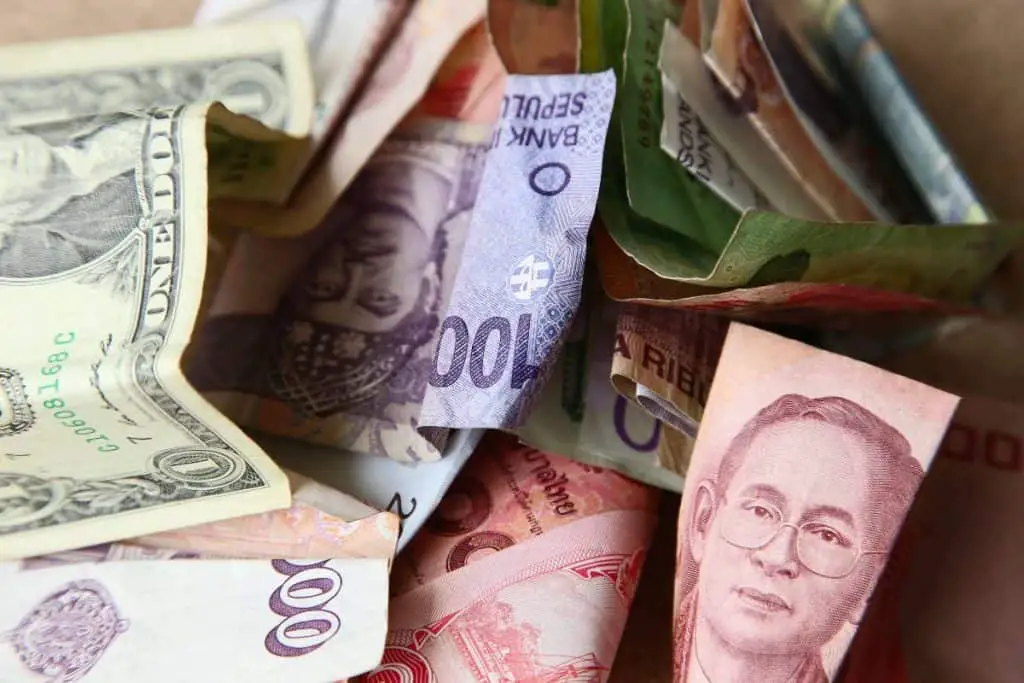The Best Strategies For Handling Thai Baht As An Expat
Hi! Tom here. As someone who’s lived in Thailand for over a decade after spending 35 years in the United States, I’ve learned a thing or two about handling the local currency. Let me share my insights about managing your money effectively in the Land of Smiles.
Key Takeaways
- Understanding Thai baht management is crucial for successful financial navigation in Thailand
- Currency exchange strategies can save you significant money on fees and rates
- Combining digital and traditional payment methods provides optimal flexibility
Understanding the Thai Baht
As someone who’s made Thailand my home, I’ve witnessed firsthand how the Thai baht has evolved. Here are my insights into Thailand’s currency system and why understanding it matters for anyone spending time here.
Historical Context
The Thai baht’s journey is fascinating. Before becoming Thailand’s official currency, people used shells and coins for trade. During my time here, I’ve seen the baht transform from a relatively stable currency to one that actively participates in the global financial market. The Bank of Thailand has played a crucial role in shaping this evolution, particularly in managing the baht’s relationship with major world currencies.
Current Market Dynamics
There have been significant changes in the baht’s behavior recently. The currency has shown greater volatility against the US dollar compared to other regional currencies. This fluctuation is largely influenced by global gold prices and market expectations of US policy changes. Through my networks in the financial sector, I’ve learned that the Bank of Thailand actively intervenes in the baht’s value to maintain stability – a practice that directly affects both tourists and residents.
Currency Denominations
In my daily transactions, I use various denominations of the baht. The currency comes in both coins and banknotes. The coins are in denominations of 1, 2, 5, and 10 baht, while banknotes come in 20, 50, 100, 500, and 1,000 baht values. I’ve found that most everyday transactions can be handled comfortably with a mix of 100-baht notes and smaller denominations.
Economic Influences
Through my years of experience here, I’ve noticed several factors that consistently affect the baht’s strength. The Thai economy’s export focus, tourism revenues, and foreign investment flows all play crucial roles. I’ve seen how global events, from the COVID-19 pandemic to international trade tensions, can create ripple effects in the currency markets that impact the baht’s value.
Future Outlook
Based on my observations and discussions with local financial experts, the baht’s role in the regional economy continues to evolve. The push toward digital payments and increasing integration with ASEAN economies suggests interesting developments ahead. I’ve noticed a growing trend toward financial technology adoption that’s reshaping how people interact with the currency.
The key to successfully navigating the Thai baht system is understanding these fundamentals while staying informed about current market conditions. In my experience, this knowledge becomes invaluable whether you’re here for a short visit or planning a longer stay.
Pro Tip: I always recommend my clients monitor the baht’s value against their home currency for at least a few weeks before making significant exchanges. This habit has helped many make better-informed decisions about when to convert their money.
Cash Management Strategies

I’ve developed what I consider to be the most efficient ways to manage cash. Let me share some insider knowledge that could save you significant money and hassle.
Exchange Options Comparison Table
| Exchange Method | Advantages | Disadvantages | Best For | Typical Spread* |
|---|---|---|---|---|
| Local Money Changers (SuperRich, Value Plus) | – Best rates – No commission – Fast service – Multiple locations | – Limited hours – Need passport – Cash only | Large exchanges ($500+ USD) | 0.5-1% |
| Thai Banks | – Secure – Reliable – Multiple services – Accept cards | – Longer wait times – More documentation – Limited hours | Regular transactions Bank services | 1.5-2% |
| Airport Exchanges | – 24/7 access – Convenient – Multiple currencies | – Poor rates – High fees – Long queues | Emergency only | 4-5% |
| Hotel Services | – Very convenient – Accept cards – English speaking | – Worst rates – High fees – Limited amounts | Absolute emergencies | 5-8% |
Regional Rate Variations
| City/Region | Best Exchange Option | Rate Quality | Notes |
|---|---|---|---|
| Bangkok | Money Changers | Excellent | Most competitive market |
| Chiang Mai | Local Banks | Good | Limited money changers |
| Phuket | Tourist Exchanges | Fair | Higher tourist premiums |
| Pattaya | Money Changers | Very Good | Good competition |
| Islands | Local Banks | Fair-Poor | Limited options |
Pro Tip: I’ve found exchanging money in Bangkok before heading to other regions can save you 2-3% on exchange rates.
Documentation Needed
| Purpose | Required Documents |
|---|---|
| Basic Exchange | – Valid passport – Clean bills |
| Bank Exchange | – Passport – Clean bills – Local address |
| Large Amounts | – Passport – Clean bills – Purpose declaration – Bank statement |
This structured approach to managing cash in Thailand has saved me thousands of dollars over the years. Remember, rates and requirements can change seasonally, so it’s always worth double-checking current conditions.
These tables reflect my personal experience and observations from living in Thailand. Always verify current rates and requirements as they can change based on market conditions and Bank of Thailand regulations.
Digital Payment Solutions
After living in Thailand for over a decade, I’ve witnessed a remarkable transformation in how people handle money here. Let me walk you through the digital payment landscape that has made my life – and countless others’ – significantly easier.
Mobile Banking Evolution
The Thai digital payments scene has exploded in recent years. When I first arrived, cash was king. Now, I regularly use my phone for most transactions. Here’s what’s working well in 2024:
Popular Mobile Banking Apps:
- SCB Easy (My personal favorite for its English interface)
- K PLUS (Kasikorn Bank)
- Bangkok Bank Mobile
- TTB Touch
Most Thai bank apps now offer English language options, making them incredibly accessible for expatriates and tourists.
QR Code Payments
One of the most convenient developments I’ve embraced is QR code payments. You’ll see these everywhere, from high-end malls to street food vendors:
| Payment Method | Acceptance Rate* | Transaction Fee | Best For |
|---|---|---|---|
| PromptPay QR | 95% | Free | Local transfers |
| TrueMoney Wallet | 85% | 0-1% | Small purchases |
| WeChat Pay | 60% | 1-2% | Chinese tourists |
| AliPay | 55% | 1-2% | Chinese tourists |
Credit Card Acceptance
The credit card landscape has improved dramatically, but there are important considerations:
Where Cards Work Best:
- Shopping malls
- Hotels
- Chain restaurants
- Modern cafes
- Supermarkets
Where Cash Still Rules:
- Local markets
- Street food stalls
- Taxis (except Grab)
- Small shops
- Rural areas
Security Considerations
Based on my experience, here are essential security practices I always follow:
- Enable biometric authentication
- Use separate accounts for daily transactions
- Set up transaction alerts
- Never save passwords on devices
- Use secure WiFi for banking transactions
The key to successfully navigating Thailand’s digital payment ecosystem is staying flexible and embracing new technologies while maintaining proper security measures. From my experience, the convenience these systems offer far outweighs the initial setup effort.
While digital payments are increasingly common, always have a backup plan. I’ve learned that even the most reliable systems can have occasional hiccups, especially during peak holiday periods or system upgrades.
Regional-Specific Tips
After a decade of exploring Thailand, I’ve learned that money management varies dramatically by region. Let me share my key insights that could save you from costly mistakes.
Bangkok Banking
The capital offers Thailand’s best banking services. I regularly use SuperRich and Value Plus here, consistently finding the most competitive rates in the country. Major areas like Sukhumvit and Silom are packed with options, from international banks to premium currency exchangers. If possible, handle major exchanges here before traveling elsewhere.
Northern Thailand
Chiang Mai and Chiang Rai operate differently. Local banks typically outperform independent exchangers in the north. I’ve found that building relationships with bank staff here pays off – they’ll often alert you to better rates or special services. However, be prepared for fewer English-speaking staff.
Southern Thailand and Islands
Tourist destinations like Phuket and Koh Samui charge premium rates. I’ve seen exchange rates up to 3% less favorable than in Bangkok. My advice? Exchange money before heading to the islands, where options are limited and fees higher.
Eastern Seaboard
Pattaya and Rayong’s expat population has driven better financial services, but rates still can’t match Bangkok. Many businesses accept multiple currencies, though usually at poor rates. Look for local money changers near beach areas for better deals.
Rural Areas
In smaller provinces, especially in Isaan, banking facilities are limited. ATMs might be your only option, and credit cards aren’t widely accepted. I always carry extra cash when visiting rural regions.
Understanding these regional differences has saved me thousands of baht over the years. While Thailand’s banking infrastructure is modern, these local nuances can significantly impact your experience and wallet.
Technology Solutions
I’ve embraced several technological solutions that have transformed daily tasks into seamless experiences. These digital tools have become essential companions in managing modern life efficiently.
Exchange Rate Tracking
Exchange rate tracking apps provide real-time currency conversions and market trends. They’ve become indispensable for international transactions and financial planning, offering instant access to accurate conversion rates.
Banking Applications
Mobile banking apps have revolutionized how we handle finances, offering convenient access to accounts, transfers, and payments. These secure platforms eliminate the need for physical bank visits and provide immediate transaction oversight.
Budget Management
Budget management tools help track spending, set financial goals, and maintain healthy financial habits. These applications provide insightful analytics and help visualize spending patterns for better financial decision-making.
Common Pitfalls and Solutions
When dealing with financial technology and transactions, several challenges can affect your banking experience. Being aware of these potential issues is the first step toward safer financial management.
Transaction Cost Awareness
Hidden transaction costs can significantly impact your finances if left unchecked. Always review fee structures carefully and look for transparent financial services that disclose all associated costs upfront.
ATM Security
Skimming devices at ATMs pose a serious security threat to your financial information. Always inspect ATMs before use, shield your PIN entry, and preferably use ATMs located inside bank branches or well-monitored locations.
Exchange Rate Considerations
Unfavorable exchange rates can erode your money’s value during international transactions. Compare rates across different providers and consider using specialized forex services rather than defaulting to standard bank conversion rates.
Seasonal Considerations
Living in Thailand has taught me that timing is everything when it comes to handling money. I’ve observed distinct patterns that can significantly impact your financial transactions throughout the seasons.
High Season Dynamics (November-February)
The bustling tourist season brings unique challenges to currency exchange and banking. I’ve noticed that exchange rates tend to be less favorable during these months, particularly in tourist hotspots. Banks and exchange booths often get crowded, with wait times sometimes stretching to an hour or more. I typically advise my clients to plan their major exchanges before this peak period kicks in.
Low Season Opportunities (March-October)
This is my favorite time for handling significant financial transactions. The reduced tourist traffic means better service at banks and more competitive exchange rates. I’ve found that money changers are more willing to negotiate during these quieter months. It’s also when you’ll find shorter queues at banks and more attentive service for complex transactions.
Festival Impact on Banking
Thai festivals significantly affect banking operations, something I learned the hard way during my first year here. During Songkran (Thai New Year), many banks operate with limited hours or close entirely. Chinese New Year brings increased demand for certain currencies, affecting exchange rates. I’ve made it a habit to plan any major money transfers well in advance of these festive periods.
Monsoon Season Precautions
The rainy season (July-October) requires special consideration for money management. I keep emergency cash in waterproof containers and rely more heavily on digital banking during this time. After experiencing a few flooded streets on the way to the bank, I’ve learned to maintain multiple payment methods and always have backup plans for accessing funds.
End-of-Year Considerations
December brings its own set of challenges and opportunities. The holiday rush combined with the high tourist season creates unique banking conditions. I use this time to review my financial strategy for the coming year, analyze exchange rate trends, and plan major currency exchanges. It’s also when I update all my digital banking security measures.
Holiday Banking Schedules
Over the years, I’ve created a mental calendar of banking availability during holidays. Royal holidays often mean complete bank closures, while other festivals might bring modified hours. I’ve found that maintaining awareness of these schedules and planning accordingly prevents any financial inconvenience.
These seasonal patterns might seem complex at first, but understanding them becomes second nature over time. I’ve learned that successful money management for THB often comes down to working with these natural rhythms rather than against them.
FAQs
What’s the best way to get Thai Baht?
Should I exchange money before arriving in Thailand?
Are credit cards widely accepted?
How can I avoid ATM fees?
What’s the safest way to carry money in Thailand?
Conclusion
Managing your money in Thailand doesn’t have to be complicated. With these strategies and insights from my 10+ years of experience, you can navigate the Thai currency system confidently and efficiently.
Have a question that wasn’t covered in this article? Feeling uncertain about any aspect of life in Thailand? You’re not alone in this journey. Our team is just a message away, contact us!






